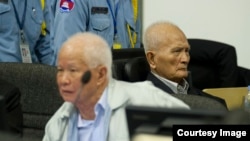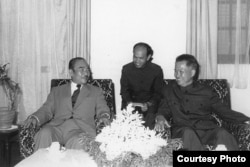The Khmer Rouge tribunal is due to announce verdicts on Friday against the two senior surviving regime officials, Nuon Chea and Khieu Samphan, for crimes against humanity and genocide committed under the totalitarian regime.
In 2014, the court found Chea, 91, and Samphan, 86, guilty of several charges filed in Case 002/01 and sentenced them to life in prison.
But the verdict this Friday in Case 002/02 focuses on a separate set of charges of crimes against humanity and genocide committed at worksites, cooperatives, security centers and execution sites, including the infamous S-21 prison in Phnom Penh. It also considers crimes against humanity and genocide committed against the Cham and Vietnamese minorities.
Neth Pheaktra, court spokesman, said the verdict would provide the justice countless Cambodians had been waiting for for years.
“We expect that the verdict announcement will form part of the process of reconciliation for the victims of the Khmer Rouge in giving them justice which they have been waiting for,” he said.
“The prosecution and civil parties want the court to give them a life sentence.”
The defense will be able to appeal the verdict, with the trial concluding if they decline to do so, Pheaktra added.
During the trial the court heard the testimony of 114 witnesses, 63 civil parties and eight experts.
The Khmer Rouge regime, which was overthrown in January 1979, claimed the lives of more than 1.7 million Cambodians through execution, disease, starvation and forced labor.
Yun Bin, 63, a Khmer Rouge survivor and a civil party in the case, said he was taken to an execution site and beaten until he fell unconscious before being dumped in an old well.
“I saw many dead people all around me in the well and the bodies were swollen and coivered in worms,” he said.
Khmer Rouge cadres threw a grenade into the well, but he managed to survive the beating and the blast, escaping the well by climbing over the bodies of his compatriots.
“I promised to the spirits that I will find justice [for them],” he said, adding that he wanted the court to hand down a sentence of life imprisonment, which is the maximum sentence available.
“I also want some [financial] compensation so that I can do ceremonies for those spirits,” he said.
Former Khmer Rouge officials have asked the court to release Chea and Samphan.
Suong Sikoeun, 83, a former diplomat, said the pair should be released as there was “no justice for them.”
“We mistreated [them]. We are Khmer. We should not imprison them,” he told VOA Khmer. “I’ve never seen any documents saying the Khmer Rouge advised to kill Cambodians,” he said.
“People like Khieu Samphan are considered as a god,” he added.
Yong Moeun, 71, who was chef to Pol Pot, the leader of the Khmer Rouge regime and an envoy to China, said the defendants were “lovers of the nation”.
“I don’t want to talk more about the past. It’s over,” she said.
The tribunal also sentenced another senior official, Kaing Guek Eav, known as Duch, the head of the S-21 death camp, to life imprisonment in 2012. Pol Pot, known as Brother Number One, died in 1988. Ieng Sary, the former foreign minister, and his wife, Ieng Tharith, the former social affairs minister, died in 2013 and 2015, respectively.
Professor Peter Maguire, author of “Facing Death in Cambodia”, said the Khmer Rouge tribunal had a mixed legacy.
“In the end, this $300 million dollar court took longer to convict three defendants than it did for the United States, England, and France to try nearly 5,000 war criminals after World War II.”
Prime Minister Hun Sen, himself a former Khmer Rouge commander who has ruled Cambodia for more than three decades, has repeatedly said he does not want to see further prosecutions of Khmer Rouge officials, which he said were costly and could lead to “civil war”.
Youk Chhang, the director of the Documentation Center of Cambodia and a victim of the regime said the process was imperfect but went a long way towards healing old wounds.
“Although the human pursuit of justice is often scarred by imperfection, the survivors realize a sense of vindication for their suffering as society acknowledges and pursues justice against the perpetrators of the horrors to which they were subjected,” he said.
“For our younger generations, having come of age in a Cambodia unencumbered by the horror of war, starvation, genocide, or mass atrocities, these proceedings will serve as a grim reminder of human potential for depravity, accented by the myriad scarring, both physical and psychological, that persist in Cambodian society.”











